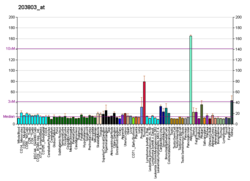| PCYOX1 | |||||||||||||||||||||||||||||||||||||||||||||||||||
|---|---|---|---|---|---|---|---|---|---|---|---|---|---|---|---|---|---|---|---|---|---|---|---|---|---|---|---|---|---|---|---|---|---|---|---|---|---|---|---|---|---|---|---|---|---|---|---|---|---|---|---|
| Identifiers | |||||||||||||||||||||||||||||||||||||||||||||||||||
| Aliases | PCYOX1, PCL1, prenylcysteine oxidase 1 | ||||||||||||||||||||||||||||||||||||||||||||||||||
| External IDs | OMIM: 610995; MGI: 1914131; HomoloGene: 9458; GeneCards: PCYOX1; OMA:PCYOX1 - orthologs | ||||||||||||||||||||||||||||||||||||||||||||||||||
| |||||||||||||||||||||||||||||||||||||||||||||||||||
| |||||||||||||||||||||||||||||||||||||||||||||||||||
| |||||||||||||||||||||||||||||||||||||||||||||||||||
| |||||||||||||||||||||||||||||||||||||||||||||||||||
| |||||||||||||||||||||||||||||||||||||||||||||||||||
| Wikidata | |||||||||||||||||||||||||||||||||||||||||||||||||||
| |||||||||||||||||||||||||||||||||||||||||||||||||||
Prenylcysteine oxidase 1 is an enzyme that in humans is encoded by the PCYOX1 gene.
See also
References
- ^ GRCh38: Ensembl release 89: ENSG00000116005 – Ensembl, May 2017
- ^ GRCm38: Ensembl release 89: ENSMUSG00000029998 – Ensembl, May 2017
- "Human PubMed Reference:". National Center for Biotechnology Information, U.S. National Library of Medicine.
- "Mouse PubMed Reference:". National Center for Biotechnology Information, U.S. National Library of Medicine.
- Tschantz WR, Zhang L, Casey PJ (Jan 2000). "Cloning, expression, and cellular localization of a human prenylcysteine lyase". J Biol Chem. 274 (50): 35802–8. doi:10.1074/jbc.274.50.35802. PMID 10585463.
- Digits JA, Pyun HJ, Coates RM, Casey PJ (Oct 2002). "Stereospecificity and kinetic mechanism of human prenylcysteine lyase, an unusual thioether oxidase". J Biol Chem. 277 (43): 41086–93. doi:10.1074/jbc.M208069200. PMID 12186880.
- "Entrez Gene: PCYOX1 prenylcysteine oxidase 1".
Further reading
- Maruyama K, Sugano S (1994). "Oligo-capping: a simple method to replace the cap structure of eukaryotic mRNAs with oligoribonucleotides". Gene. 138 (1–2): 171–4. doi:10.1016/0378-1119(94)90802-8. PMID 8125298.
- Zhang L, Tschantz WR, Casey PJ (1997). "Isolation and characterization of a prenylcysteine lyase from bovine brain". J. Biol. Chem. 272 (37): 23354–9. doi:10.1074/jbc.272.37.23354. PMID 9287348.
- Suzuki Y, Yoshitomo-Nakagawa K, Maruyama K, et al. (1997). "Construction and characterization of a full length-enriched and a 5'-end-enriched cDNA library". Gene. 200 (1–2): 149–56. doi:10.1016/S0378-1119(97)00411-3. PMID 9373149.
- Nagase T, Ishikawa K, Suyama M, et al. (1999). "Prediction of the coding sequences of unidentified human genes. XII. The complete sequences of 100 new cDNA clones from brain which code for large proteins in vitro". DNA Res. 5 (6): 355–64. doi:10.1093/dnares/5.6.355. PMID 10048485.
- Strausberg RL, Feingold EA, Grouse LH, et al. (2003). "Generation and initial analysis of more than 15,000 full-length human and mouse cDNA sequences". Proc. Natl. Acad. Sci. U.S.A. 99 (26): 16899–903. Bibcode:2002PNAS...9916899M. doi:10.1073/pnas.242603899. PMC 139241. PMID 12477932.
- Clark HF, Gurney AL, Abaya E, et al. (2003). "The Secreted Protein Discovery Initiative (SPDI), a Large-Scale Effort to Identify Novel Human Secreted and Transmembrane Proteins: A Bioinformatics Assessment". Genome Res. 13 (10): 2265–70. doi:10.1101/gr.1293003. PMC 403697. PMID 12975309.
- Gerhard DS, Wagner L, Feingold EA, et al. (2004). "The Status, Quality, and Expansion of the NIH Full-Length cDNA Project: The Mammalian Gene Collection (MGC)". Genome Res. 14 (10B): 2121–7. doi:10.1101/gr.2596504. PMC 528928. PMID 15489334.
- Liu T, Qian WJ, Gritsenko MA, et al. (2006). "Human Plasma N-Glycoproteome Analysis by Immunoaffinity Subtraction, Hydrazide Chemistry, and Mass Spectrometry". J. Proteome Res. 4 (6): 2070–80. doi:10.1021/pr0502065. PMC 1850943. PMID 16335952.
- Wouters MM, Neefs JM, Kerchove d'Exaerde A, et al. (2006). "Downregulation of two novel genes in Sl/Sld and W(LacZ)/Wv mouse jejunum". Biochem. Biophys. Res. Commun. 346 (2): 491–500. doi:10.1016/j.bbrc.2006.05.132. PMID 16765319. S2CID 21347125.
This article on a gene on human chromosome 2 is a stub. You can help Misplaced Pages by expanding it. |




